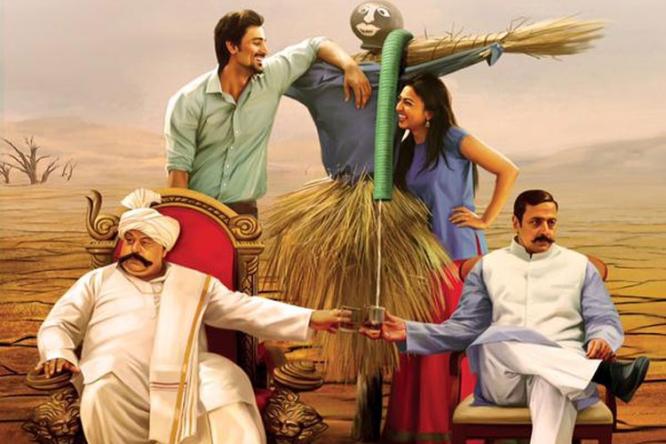 Cast: Kunal Kapoor, Radhika Apte, Gulshan Grover, Saurabh Shukla
Cast: Kunal Kapoor, Radhika Apte, Gulshan Grover, Saurabh Shukla
Director: Nila Madhab Panda
There’s a lot that we have read about water crisis in India. And even though we are all aware of its causes and cures, filmmaker Nila Madhab Panda uses satire in ‘Kaun Kitney Paani Mein’ to show the wide-ranging implications of water shortage to explain just how it touches every aspect of life.
The story begins with a quick insight into the life in a village of Odisha. Caught in caste tangles, this drought-struck village has been divided into two sections – those inhabited by lower caste and those where only people belonging to upper caste stay.
Raja Brij Kishore Singh Deo (Saurabh Shukla), who belongs to a Kshatriya family, lost his sister after being shot at by his father because she ruined her family’s ‘stature’ by falling for a man from a lower caste. Because honour killing wasn’t enough as a punishment for breaking the caste boundary, his father also erected a wall to ensure those belonging to the lower caste could never access Upri. On being ostracized for belonging to the lower caste, these people shifted to another village called Bairi.
Even though everything had fallen apart, inhabitants of Bairi realized all options that were available to them, and use them in the best possible way to collect water naturally and use it for farming practices. With the support of their leader Kharu Pehalwan (Gulshan Grover) and his daughter Paro (Radhika Apte) they could endure every hardship, survive the most trying and difficult times and help the village thrive. Over three decades down the line, the contrasting difference between the conditions in Upri and Bairi elucidate that only those who slog, can succeed. While Raja Braj, despite staying in a palace, has to deal with water and electricity scarcity, his adversary Kharu is busy thinking of ways to help his villagers prosper.
What really works in the favour of the film is the manner in which the story has been structured. Right from the time when the male protagonist should enter to how the plot should alter for the worse and just how the climax should fall and eventually go up, every principle of storytelling has been given adequate attention.
Director Nila is incredible in identifying all factors that distinguish the life in Upri and Bairi. It is depressing to see how people in Upri haven’t seen a wedding in years, use water packets as the new currency and find desperate measure – like digging a tunnel – to tackle the pressing shortage of water.
Things undergo a huge change when situations compel the next generation – Paro (Radhika) and Yuvraj (Kunal) to meet and fall for each other.
The most interesting parts of the film are when Brij interacts with his son Yuvraj. Brij is a cynic in all sense of the word. From being doubtful of his educational qualifications and potential, to degrading him for his inability to seduce Paro, Brij does an amazing job in playing a bald king with a bloated belly, who speaks in broken English and has no option but to survive on liquor. Needless to say, he is the biggest strength of the film.
Performances by Paro and Yuvraj were decent.
The film’s forceful dialogues not only move the story forward but also play a key role in establishing characters and their relationships. Besides disclosing conflicts and causing reactions, it also talk about the practices of casteims and just how complicated and problematic they are. Dialogues such as ‘Unchey log kisi ke nahi hotey’, ‘Asli raja who jiske paas pani hai’, ‘Humare gaon nazdeek hai aur hum alag hain’ shows how caste-system isn’t obsolete and useless even in the modern context.
The background score of ‘Kaun Kitney Paani Mein’ is an additional benefit. Director Nila needs to be lauded for exposing some of the critical issues facing water even in the present times, but it stills remains a formulaic film.

